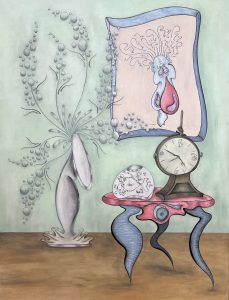Achieve Happiness Today
My favorite question, since I could speak, has been: Why?
My father faithfully would reply to my question with: Y is a crooked letter.
His reply captures his — and my — life philosophy. It also serves as the title for this Warts & All column, where we explore the meaning of life and living. I gift you that philosophy of life: life is what you make it, life is a joy, and life is simple.
In the last installment of Y is a Crooked Letter (June 10th), we examined positive psychologist Martin Seligman’s Happiness Formula. As a quick reminder, the formula states that your happiness (H) equals your genetic set point (S) plus your circumstances (C) plus the aspects in your voluntary control (V).
You cannot change your set point. It’s genetic. Some people are glass half-full critters and some are glass half-empty critters. But the effect of that set point, the S, is only part of the picture. And since we cannot alter it directly, we must work on our happiness in other ways.
Science has shown your circumstances, the C, is only ten percent of your experience of happiness. We know that living in a democracy, getting married, having friends and connections, and being physically healthy have some effect on ones C variable. We also know that money, education, and climate have zero — zero — effect on happiness. That’s right. Don’t bother with buying that new phone. Circumstance is such a small part of the formula, it’s almost negligible.
We learned that one aspect of that formula, the aspects of life in our voluntary control (V), is key to being and staying happy.
V is where you must focus. Your internal outlook is where you have the choice to be happy or not.
What aspect of life is in your voluntary control? That’s where Seligman, my dad, and I come into your picture. You are in control of three aspects of your own happiness. You control (1) how you interpret your past, (2) how you live your present, and (3) how you envision your future.
Your Past and Your Future
I’m going to tackle your past and future in a few paragraphs using a simple concept of physics.
Don’t scroll off this page! Don’t be a chickenshit. No, you will not need higher mathematics to grasp this concept. In fact, I have taught this essential truth for over twenty years — even to kindergarteners.
The concept is entropy. See, in this universe, things decay. Just consider a plant or your couch. Your car. Your pet. Your body. Entropy is the reason. One law of thermodynamics (here’s the physics) is that over time, everything — everything — changes from an ordered state to a disordered state. And this is how time happens. Simply, we move through time in that one direction — from order to disorder. No matter what time-traveler Dr. Who does. We cannot travel or be back to the past or forward to the future. We only exist in the now, in the present.
Our minds, however, travel back and forth all the time. And that’s how we dilute our happiness.
If your mind travels to the past into memories, you may experience nostalgia, resentment, regret, grief, guilt. Yet, those emotions do not result from your now, your present. Reality.
If your mind travels to the future, you may attempt to visualize likely outcomes — or be plagued with anxiety about whatand if and oh no. Those emotions, too, do not result from your now, your present. From reality.
Negative interpretation of your past and future are your choice.
If you decide to view your past with compassion, forgiveness, pride, satisfaction, understanding, you will be happier. Period. Full stop.
If you decide to view your future with optimism, hope, faith, excitement, curiosity, you will be happier. Period. Full stop again.
And it starts with realizing your thoughts about places in time where you are not existing are fantasy. Your guilt or grief — your anxiety — is a choice.
Take radical responsibility and change your emotional state.
For the past:
- Forgive. Forgiveness is not about letting the perpetrator “get away with it.” Forgiveness is about letting go of the past’s hold on you. About not defining yourself as a victim. It’s amazing how letting go of a grudge — or redefining your experiences — can free your energy.
- Celebrate. Redefine your experiences as moments of learning. Points of growth. Places of opportunity. Doors that closed so others could open. Look for reasons to be grateful.
- Reprogram. Many believe that one’s past absolutely directs one’s future. Bollocks. Let go of any idea of destiny. Just because you failed or had hard times does not mean you are locked in that script. Everyone suffers and struggles. Even the most successful person has been down on his or her luck. It’s about knowing that yesterday does not dictate today.
For the future:
Handling anxiety about one’s future is all about disputing pessimistic thoughts.
If you worry about tomorrow’s test or presentation, tomorrow’s investment, tomorrow’s whatever — stop the thought. Slap it down. Reprogram yourself to be realistic: (a) I don’t know what is going to happen; (b) I have prepared, done my best, am competent…, © I am capable, (d) I have succeeded before and will again.
You get the idea. Realize that you are not in the future, you cannot predict the outcome — and your negative thoughts are your script. You have trained yourself to engage in that negative self-talk.
Stop it.
For each of these areas, if you find you cannot achieve these approaches, seek professional help. Because if you are mentally trapped in a negative view of your past or future, you will have a very hard time maintaining happiness.
Your Present — Your Now — Is the Key
Here, in the now, in reality, we have the key to true happiness.
But, you say, we already know circumstance has little to do with happiness. Even if I have the nice house, the great spouse, money, a good job — it won’t matter!!!
Therefore, you must differentiate between pleasure and true gratification.
Pleasure is a momentary circumstance. Delicious cake. A new phone. A winning baseball game. A strong orgasm. Yippee! But only a circumstance.
We also know that achievement falls into circumstance. Quite counterintuitive, but winning or getting that promotion, are momentary. The way to be perpetually unhappy: Goal after goal seeking. Psychologists know that once you achieve the goal, the circumstance wanes and you are right back to setting and achieving the next. You’ve said it. You hear others say it. “I’ll be happy when…”
Wow.
Forget momentary pleasure. Notice that although you watch your favorite show every week, it’s only circumstance and fleeting. That cupcake? Fleeting. That passionate sex? Circumstance.
True happiness in the now is immersive. Finding activities that are gratifying. Psychologists call it flow. Flow is finding activities that align with your skill — and strengths — but are challenging enough to create a deep level of engagement.
Find a hobby. A sport. A volunteer activity. An educational pursuit. Challenge yourself.
You’ll know you have found the right thing when you lose track of time while you’re doing it.
For example: When I write, my husband will tap me on the shoulder to remind me to eat. Because I’ve been at it for six hours and didn’t notice the time. I’m all smiles! When I’m on a photoshoot, I regularly go over the hour assigned for the session. Because I am so immersed in what I’m doing — it’s pure joy.
Make a list of activities and interests where you have lost track of time. It could be scrapbooking. Or playing pool. Or running. Or playing with your grandchildren. You want to do things that play to your strengths. That engage you. That challenge you.
The fact is, if you can engage in gratifying activities as your circumstance — you’ve upped two of the variables of happiness.
Back to Dad
The key to that present happiness — to staying in a flow state — is using your signature strengths. My dad knew this and taught me this — even if he knew and did it long before Martin Seligman wrote his book on happiness. My dad was perpetually happy.
- He looked at his past as moments of life lessons. He forgave. He had compassion for others — and himself. After I dropped out of college and ended a crap marriage and was broke and broken, he said: “You learned some lessons. Yeah, you done f’ed up. Well, you know what not to do now. Move on.”
- He saw the future as Who the Hell Knows — Let’s See What Will Happen. It will be what it is — and I’ll do my best when I am there. When I had a job opportunity out-of-state and was terrified, he said: “Whelp, you do what you do. If it doesn’t work out, you move on. But isn’t it exciting to give it a shot?” I love that outlook. It’s like the quote from Better Off Dead: Go that way, really fast. If something gets in your way, turn.
- He lived in the moment, using his signature strengths: appreciation, leadership, love of learning, creativity, curiosity, and humor.
Happiness is Using Your Strengths
If, every day, in the present, you are engaged in activities that let you use your personal strengths, you will experience lasting happiness. The key is identifying those signature strengths. Go though the list and mark how you have or can develop each strength. Try to identify your five or six key strengths. Note how you can use those strengths every day. Here’s the list:
Transcendent strengths (those that overcome):
- Appreciating beauty and excellence. Recognizing your own and others’ uniqueness. Seeing beauty in everything and every moment. This is not an intellectual analysis. You must emotionally experience beauty.
- Gratitude. Say thank you. Show you appreciate others. Be thankful for even the little things.
- Hope. Believe in yourself. Think positive thoughts. Look at the future as a wonderful challenge.
- Humor. See the fun in life and living. Keep it light. Know that humor has a place and time.
- Spirituality. Find meaning in your life and in living. Even if that meaning is only a guess.
Justice strengths:
- Fairness. Treat others equally — and do not judge another based on surface qualities. Grant others bad and good days.
- Leadership. Take charge and help others succeed.
- Teamwork. Learn to follow and be part of a team.
Courage strengths:
- Bravery. Face fear and act, no matter what. The scarier the better.
- Honesty. Be truthful with others — and yourself. Seek to live an authentic life.
- Perseverance. Persist no matter what — or who — gets in your way.
- Zest. Approach every day, every moment, every activity, with an attitude of: I’m about to eat the most delicious meal ever! Every moment is an adventure. Have to clean the bathroom? Conquer it, baby!
Wisdom strengths:
- Creativity. Practice creativity — even if you are trying a new recipe! Think of new ways to do things — and be able to try new ways even if it will not be perfect. (Let go of perfectionism.)
- Curiosity. Actively seek out new situations and challenges. Don’t lock yourself into favorite anything. Meet new people. Ask questions, like Why?
- Open-mindedness. Be open to information — and to evaluating ideas and concepts even if the information opposes what you want to believe. This is an important one for our society. You can consider — and respect — another perspective without agreeing with that perspective.
- Love of learning. Read a book. Explore. Travel. Try new things. Make lots of glorious mistakes!
- Perspective. Realize that your view is only one perspective — and be open to understanding and exploring others’ views. But be able to offer your logical and considered counsel.
Temperance strengths (points of balance):
- Humility. Do your best with no pat on the back. This includes notposting every action of your day on social media.
- Prudence. Act with thoughtfulness and care. Do not take risks that could endanger you or others.
- Self-regulation/control. Histrionics and drama are not a strength. Know the time and place for emotional expression. Have enough awareness to know when enough is enough, whether it’s attention or cake.
- Forgiveness. Let others make mistakes. Let go of revenge or grudges. You can forgive without forgetting.
Humanity strengths:
- Kindness. Thoughtful, compassionate, and considerate. Hold the door open. Volunteer. Care. Do a good deed every day. I make it a point to give every person I meet a smile.
- Love. Let yourself love and be loved. Foster and find relationships based on love. Give loved ones your attention and time.
- Social or emotional intelligence. Attempt to understand others’ and your own emotions.
Once you go through the list, feel free to take the assessment here. It’s amazing how much happier you will be when you are engaged in activities that let you play your game your way. You can master the V of the happiness formula — and experience the world like my dad and me!



